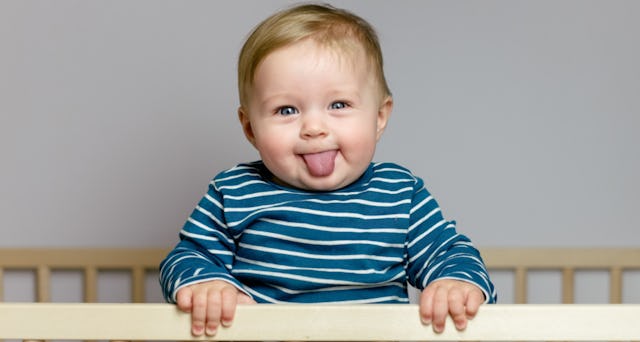You Might Be Surprised At How Early Kids Start Appreciating Humor

If you have a child over the age of 3, more than likely you have sat through a nonsensical knock knock joke or two. You’ve watched your kids laugh at the strangest cartoons. And I am certain you have said to yourself “I have no idea why they find this funny.” Kids indeed have the weirdest sense of humor. And up until recently, we didn’t have much of a timeline as to when they started to develop their own little sense of the things that make them giggle.
A recent study conducted by a group of psychologists, called the Early Humor Survey (EHS), aims to give parents a grasp on just that. And you may be surprised at how early kids develop a sense of humor.
The Early Humor Survey was given to nearly 700 parents in the US, UK, and Australia. In the first year of life, parents said they observed multiple ways in which their children appreciated humor and sometimes produced it themselves. More than 75% of parents, for instance, said their kids were laughing when they were just two months old. By the age of one, virtually all parents reported laughter from their offspring.
Humor grows and evolves as children age as well.
Babies don’t have a full understanding of humor, but can tell when you’re happy or smiling. However, the authors of the EHS found that children generally do start to appreciate humor before they can produce it themselves. The findings support previous research that suggests humor develops alongside motor, social, and language skills. This means that by the age of 3, most children are telling their own “jokes,” though they recognize it much earlier in toddlerhood. So your 10-month-old smiling when you play peekaboo is totally not a fluke — they’re developing their own little sense of humor.
Why is developing humor important in children?
According to an article from KidsHealth, kids with a well-developed sense of humor are happier and more optimistic, have higher self-esteem, and can handle differences (their own and others’) well. Kids who can appreciate and share humor are better liked by their peers and more able to handle the adversities of childhood — from moving to a new town, to teasing, to torment by playground bullies.
Studies have found that people with a good sense of humor are less likely to be depressed and are generally more optimistic. We are our children’s biggest role models, so it goes without saying that they develop a good amount of their humor from interactions with us.
As parents, here are a few ways that we can encourage humor in our children:
- Laugh with our children, even when we don’t get their jokes.
- Make jokes and tell silly stories.
- Point our humor in other environments such as books you read together or TV shows
It’s important that while we are teaching our kids healthy humor, we discourage them from the type that harms as well. Bullying and teasing are lessons that will come up while your child is finding their way.
As a mom, it’s been interesting to see my children’s jokes switch from peekaboo to poop jokes. And studies like the EHS help us realize that maybe there’s really something behind those early giggles after all.
This article was originally published on